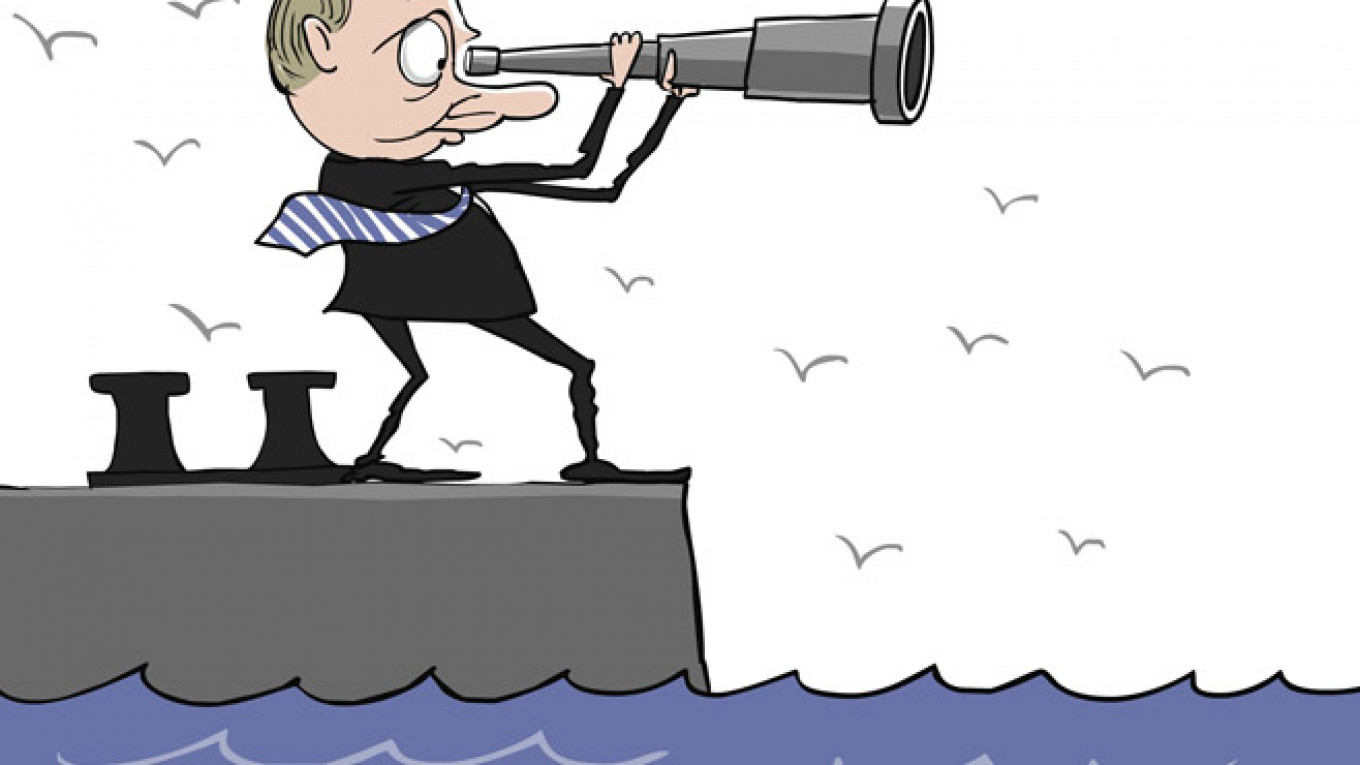French President Francois Hollande has essentially vetoed the transfer of the first Mistral helicopter carrier to Russia. The Elysee Palace announced that Moscow's actions in Ukraine do not create the necessary conditions for the transfer of the warship. In response, Russian officials threatened to appeal to international arbitration and sue France for 3 billion euros — against the purchase price of 1.2 billion euros for two Mistral carriers — and several State Duma deputies have called for a ban on imports of French wine.
The situation has obviously reached an impasse. The Kremlin shows no intention of budging on its Ukraine policy and the French authorities worried that they might ultimately see their Mistral ship landing Russian troops on Ukraine's Black Sea coast. The Mistral deal seems to have run aground for the foreseeable future.
In an attempt to put a good face on a bad situation, the Defense Ministry hurried to declare that the warships were not all that necessary anyway. If that is true, why did Russia agree three years ago to put up so much money for them? I think the Mistral deal symbolized the attempt to establish military cooperation between Russia and the West, and France's refusal to transfer an already completed ship indicates the failure of that attempt.
Then-Prime Minister Vladimir Putin made the initial decision for political reasons. First, he wanted to express his gratitude to then-French President Nicolas Sarkozy for helping Moscow overcome its international isolation following the Russia-Georgia War of 2008.
Second, Moscow discovered during that war that its weaponry had become hopelessly obsolete. According to reports, the marines of Russia's Black Sea Fleet received orders to make a landing in Abkhazia and began loading the landing craft on board. However, technical problems caused the loading process to drag on for five days — that is, over the entire length of the war. Obviously, a landing craft built 30 years ago is practically useless for short, intense local conflicts.
Then-Defense Minister Anatoly Serdyukov, who clashed openly with defense industry officials, had his own reasons for the deal. His deputy stated very frankly that the Defense Ministry had no intention of financing ineffective defense industry products. The Mistral purchase was to have been a signal to the defense industry that effectively said: "Either you produce what the Defense Ministry needs, or we will purchase our weapons abroad."
But the most important thing in my opinion is that the Mistral represents a new philosophy for Russia's naval military policy. Russia inherited its entire fleet from the Soviet Union, and that surface fleet was built for one main objective: to protect and support the operations of submarines so that, in the event of hostilities, those subs could fire their missiles at the United States before being destroyed. Today's Russian fleet carries out the same task.
However, the Mistral is built for the fundamentally different naval objectives of carrying out anti-terrorist and anti-pirate operations and evacuating Russian citizens from states convulsed by internal conflicts — in short, for all operations related to the so-called "projection of force." Russian admirals did not welcome changing the combat mission of the fleet and therefore opposed the Mistral. Shipbuilders were even more upset about the deal because they knew they lacked the capability to produce a comparable vessel.
Thus, Russian admirals and defense industry firms stand to benefit the most from France's refusal to deliver the Mistral warships and from Russia's return to a Soviet-style closed economy. That means the Russian armed forces will receive only the military equipment the domestic defense industry is capable of producing — whether they need it or not.
With oil prices falling, corrupt officials see defense spending as their last opportunity to pocket government funds — and they have no intention of sharing that windfall with foreign defense industry competitors. Putin's recently announced policy of substituting Russian goods for previously imported products will enable those senior officials to siphon off a significant portion of budgetary funds while blaming the failure of the government's plan to modernize the military on the insidious machinations of the West. That is what seems to be happening during the endless series of meetings Putin holds with Russia's defense industry leaders.
Russia's plans to project its force to distant locations with the help of the Mistral warship turn out to be unnecessary now that Moscow is rapidly spiraling downward into a confrontation with the West. The Russian navy can again focus on the former tasks of attacking a potential enemy's aircraft carrier groups and protecting nuclear submarines long enough to launch their missiles. That means the admirals do not need any additional training and that Russia's 30- to 40-year-old weapons will suffice for the current Cold War.
Alexander Golts is deputy editor of the online newspaper Yezhednevny Zhurnal.
A Message from The Moscow Times:
Dear readers,
We are facing unprecedented challenges. Russia's Prosecutor General's Office has designated The Moscow Times as an "undesirable" organization, criminalizing our work and putting our staff at risk of prosecution. This follows our earlier unjust labeling as a "foreign agent."
These actions are direct attempts to silence independent journalism in Russia. The authorities claim our work "discredits the decisions of the Russian leadership." We see things differently: we strive to provide accurate, unbiased reporting on Russia.
We, the journalists of The Moscow Times, refuse to be silenced. But to continue our work, we need your help.
Your support, no matter how small, makes a world of difference. If you can, please support us monthly starting from just $2. It's quick to set up, and every contribution makes a significant impact.
By supporting The Moscow Times, you're defending open, independent journalism in the face of repression. Thank you for standing with us.
Remind me later.







